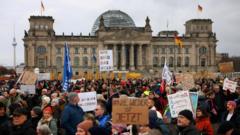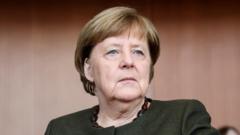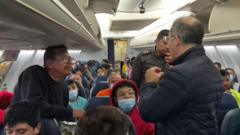The recent Christmas market attack in Germany, which resulted in five fatalities, has ignited intense political discourse as lawmakers scramble to address issues surrounding immigration and security.
Political Fallout from Christmas Market Tragedy in Germany

Political Fallout from Christmas Market Tragedy in Germany
After a tragic Christmas market attack, political tensions rise as parties leverage the incident for their agendas ahead of upcoming elections.
Article Text:
In the aftermath of a horrific attack at a Christmas market in Magdeburg, Germany, that left five dead, the nation is witnessing a spike in political tensions. As investigations unfold, focus has shifted from mourning the victims to scrutinizing the government’s preparedness for such incidents.
Authorities apprehended a Saudi refugee, identified as a 50-year-old physician, believed to be behind the S.U.V. attack that also injured over 200 individuals. This has reignited discussions surrounding immigration policy and public safety, with various political figures attempting to capitalize on the situation as Germany prepares for snap elections in February.
Amid calls for national unity, criticism towards the government has surfaced swiftly, even drawing comments from high-profile figures like Elon Musk. The controversy has further intensified following the sudden collapse of Chancellor Olaf Scholz's government due to a recent loss of confidence vote in Parliament.
In response to the attack, the far-right Alternative for Germany party (AfD) organized a vigil in Magdeburg. However, their chancellor candidate, Alice Weidel, made headlines by asserting that such tragedies are linked to "uncontrolled immigration." With the AfD polling strongly, they are seizing the opportunity to push for stricter immigration policies, demanding that the government take urgent action to protect citizens.
As more evidence comes to light regarding the attacker’s past interactions with authorities, public outcry grows over whether the warning signs were ignored. Critics are calling for accountability from officials as questions mount about the effectiveness of current security measures in preventing such tragedies.
With an already tumultuous political landscape, the ramifications of this tragic event are likely to shape the upcoming electoral campaigns—where the discussions of immigration, security, and public safety will take center stage.
In the aftermath of a horrific attack at a Christmas market in Magdeburg, Germany, that left five dead, the nation is witnessing a spike in political tensions. As investigations unfold, focus has shifted from mourning the victims to scrutinizing the government’s preparedness for such incidents.
Authorities apprehended a Saudi refugee, identified as a 50-year-old physician, believed to be behind the S.U.V. attack that also injured over 200 individuals. This has reignited discussions surrounding immigration policy and public safety, with various political figures attempting to capitalize on the situation as Germany prepares for snap elections in February.
Amid calls for national unity, criticism towards the government has surfaced swiftly, even drawing comments from high-profile figures like Elon Musk. The controversy has further intensified following the sudden collapse of Chancellor Olaf Scholz's government due to a recent loss of confidence vote in Parliament.
In response to the attack, the far-right Alternative for Germany party (AfD) organized a vigil in Magdeburg. However, their chancellor candidate, Alice Weidel, made headlines by asserting that such tragedies are linked to "uncontrolled immigration." With the AfD polling strongly, they are seizing the opportunity to push for stricter immigration policies, demanding that the government take urgent action to protect citizens.
As more evidence comes to light regarding the attacker’s past interactions with authorities, public outcry grows over whether the warning signs were ignored. Critics are calling for accountability from officials as questions mount about the effectiveness of current security measures in preventing such tragedies.
With an already tumultuous political landscape, the ramifications of this tragic event are likely to shape the upcoming electoral campaigns—where the discussions of immigration, security, and public safety will take center stage.























